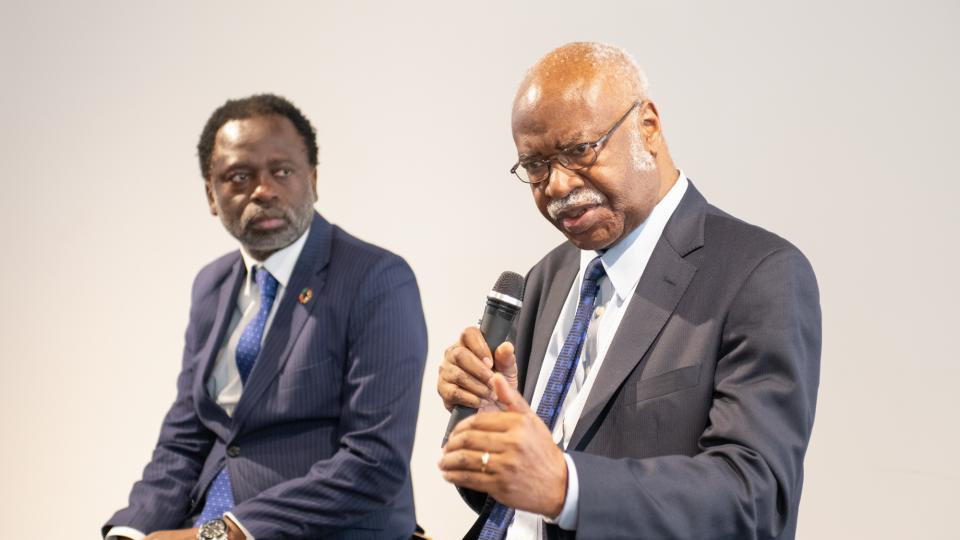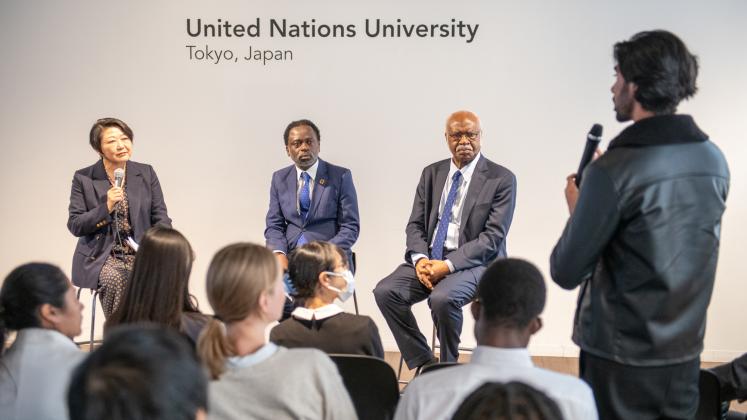On 1 February 2025, UNU hosted a special event welcoming His Excellency Mr. Philémon Yang, the President of the 79th Session of the United Nations General Assembly, for an enlightening dialogue with students and academics. The session provided a dynamic forum for young scholars to engage in discussions on the United Nations (UN), the Sustainable Development Goals (SDGs) and the evolving landscape of multilateralism.
The session was moderated by Kaoru Nemoto, Director of the United Nations Information Centre (UNIC), Tokyo. In her opening remarks, she emphasized the critical role of youth in shaping global policies and encouraged participants to take full advantage of this rare opportunity to engage with President Yang and UNU Rector Professor Tshilidzi Marwala.
In his address, Rector Marwala reflected on key milestones within the UN, with 2025 marking the 80th anniversary of the UN Charter and the 50th anniversary of UNU. The speech celebrated the UN's achievements in nuclear non-proliferation, global health, human rights and climate action, while also acknowledging current challenges such as the slow progress on the SDGs and the need for renewed commitment to global cooperation. Central to this discussion was the UN Secretary-General's vision of “UN 2.0”, which aims to build a more robust, agile and impactful UN.

President Yang then gave comprehensive remarks on the unique place of the UN throughout history and its role within the current multilateral system. Spotlighting the interdependence of the three pillars of the UN — Peace and Security, Human Rights, and Sustainable Development — President Yang highlighted key initiatives he intends to undertake in line with the theme of his presidency: “Unity and diversity for advancing peace, sustainable development and human dignity”.
These initiatives include convening high-level thematic debates, joint meetings on interlinked issues, and task forces focused on meeting the objectives of the Pact of the Future. Stating that, “One of the greatest weapons nature gave us is dialogue,” he emphasized the central importance of creating platforms for inclusive dialogue, highlighting their transformative role in fostering unity and tackling complex global challenges. He concluded his remarks with optimism about the role, agency and capacity of youth.
This was a fitting transition to an interactive question and answer session with students from Japan’s leading universities, including Sophia University, Keio University, the University of Tokyo, Tokyo Institute of Science, Aoyama Gakuin University, Waseda University, and the UNU Institute for the Advanced Study of Sustainability.
Students’ questions were not only insightful but also sparked a conversation that showcased their commitment to solving global problems. Numerous critical topics were addressed, including the growing digital divide, the pivotal role of youth in driving progress towards the SDGs, the importance of education in the Global South, and the ongoing fight for gender equality.
By actively involving today’s youth, the event evolved into a powerful platform that amplified young voices, igniting a meaningful conversation about building a safe, just and sustainable future for everyone, everywhere.



